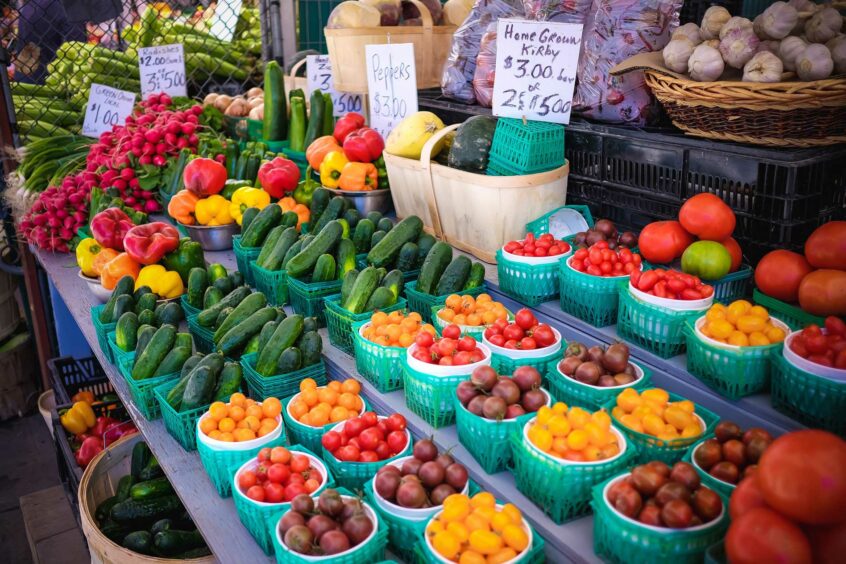Where is the Best Place to get Groceries?
Mix-n-Match Your Food Shopping Resources
Kari Collett, RDN, LDN, CLT with A to Zinc Nutrition, LLC
Clients ask me all the time, “Where do you do your grocery shopping, Kari?” This question usually comes when the patient has been given a list of key foods to focus on to reduce inflammation and a short list of foods to avoid. They recognize the challenge in front of them in that they’re going to have to pay very close attention to labels and foods, and their shopping experience is about to become challenging.
I wish I could refer them to an easy “one-stop-shop” kind of grocery store where they can get everything they need all in one place without having to worry about unwanted added ingredients or poor-quality foods. Truth is, I’ve never found such a place. To obtain the variety of foods I want that meet my quality criteria, I have to shop at a variety of places. Every store has something a bit different on the list of things I need and like. I don’t go to all the locations in one day; I mix and match when and where I do my shopping in a sort of rotating fashion so that I hit all the stops over a period of a couple months. I stock up on the items that are freezable or shelf stable. Most places I shop have fresh produce for my day-to-day needs.
But in an attempt to answer the question best I can, let me tell you about a few of my favorite places:
1. Farmer’s Markets
So very seasonal, yet so very good. For the most part, farmer’s market vendors are pretty wholesome. It’s not a guarantee, but when in doubt, you can talk with the farmers and producers to learn more about their food philosophy and their production practices. Many farmers practice organic methods but skip the certification process to avoid extra expenses. For me, that works. Some may do everything by hand; others may use heavy equipment. The more you learn, the better you can decide the best sources for you. If they are completely transparent, as many are, they may welcome you at their farm for a tour.
The greatest advantage to visiting farmer’s markets, aside from the relationships we build with our food producers, is that the produce is rich with nutrition. Most produce is harvested 1-2 days in advance of the market day, and it likely traveled less than 50 miles to get to the event. Because the foods were sun ripened, recently harvested, and traveled locally, they retain a lot more of their nutrients than so many of our off-season fresh produce items.
2. Local Food Co-ops
The next best option in terms of quality and nutrition are the local food co-ops. Like other grocery stores, they’re open year-round. But unlike other grocery stores, their food values are more in line with my food values for healthy eating. Co-ops develop relationships with local farmers and resell their goods. They focus on seasonal produce, especially during summer and fall months. Many of their produce items and products are organic, sustainable, and fair trade – meaning they care about the environment and humanity. Co-ops are all about community which is why they provide memberships to their shoppers for a nominal fee. Both the consumers and the retail store benefit from this arrangement.
Co-ops aren’t perfect by any means. While much of what they offer is fresh, local, whole foods, there is still an abundance of food products. You likely won’t find many products with some of the typical harsh food chemicals you’ll find in conventional store products, but that doesn’t mean they are completely free of additives. You’ll still need to read your labels. The other disadvantage to co-ops is that they are located in smaller spaces with limited selections and have generally higher prices.
3. Large Health Food Stores
Many large retailers appeal to consumers who are trying to eat healthy by commercializing some of the same concepts that started in food co-ops such as providing organic and less processed food options. You might have heard of places like Whole Foods, Fresh Thyme, Trader Joe’s, or Sprout Markets. These places are great at offering a wide variety of produce, including uncommon and unusual fruits and vegetables, and fresh items that are not in season locally. Because they are able to purchase produce in large quantities, they are able to resell items for a lower price allowing for more options to the consumer on a budget.
But that’s about where the advantages stop. If you really look around the stores, the majority of what you see is processed foods. Don’t be fooled by all the organic product labels on foods in stores like these. Just because it’s organic, doesn’t mean it’s healthy. You’ll have to do extensive label reading. Their organic produce is mixed in with conventional causing the shopper to pay extra attention to pricing and sources. Furthermore, they usually have deli, bakery, cheese, or other specialty sections with premade foods that are almost no better than a conventional grocery store. I don’t care if a chocolate cake with frosting is made from all organic ingredients; it’s still a chocolate cake with little nutrition value.
4. Your Needs; Your Grocery List
Let us help you create your list of foods and food sources that best support your health goals. To learn more about optimizing your health and working with a nutrition provider and grocery shopping that is right for you, schedule a free Discovery Call: https://atozincnutrition.com/schedule/
Kari Collett, RDN, LDN, CLT with A to Zinc Nutrition, LLC
For a printable PDF, click here.

